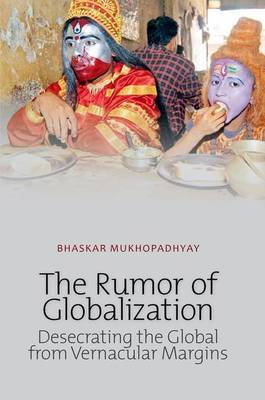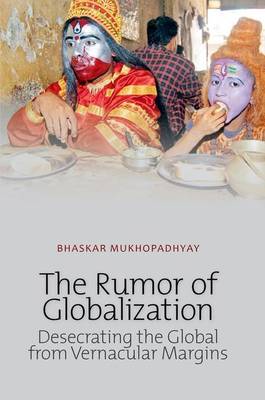
- Retrait gratuit dans votre magasin Club
- 7.000.000 titres dans notre catalogue
- Payer en toute sécurité
- Toujours un magasin près de chez vous
- Retrait gratuit dans votre magasin Club
- 7.000.0000 titres dans notre catalogue
- Payer en toute sécurité
- Toujours un magasin près de chez vous
Rumor of Globalization
Desecrating the Global from Vernacular Margins
Bhaskar Mukhopadhyay
Livre relié | Anglais
56,45 €
+ 112 points
Description
Drawing on recent theories of virtuality, performativity, and governmentality, and on post-colonial activist scholarship, this book presents a series of ethnographic and archival studies of what Mukhopadhyay terms "vernacular globalization" in India. The book's six provocative chapters cover a wide range of events, objects, histories, narratives and episodes with the intent of interrogating what Franz Fanon called the "zone of occult instability where the people dwell". They span subjects as diverse as the quotidian commodity fetishism of rural cargo cults which thrive on bazaar rumours about Chinese dumping in Communist Calcutta; desi cyberporn showcasing "fat aunties" and Gandhi; Indo-Persian travelogues about England and women's travel narratives to Japan, embodying local traditions of cosmopolitanism; folk scroll paintings about 9/11 in the art historical mode; and vernacular civic traditions of urbanism as interpreted through grotty slum photographs. The Rumour of Globlization presents facades of vernacular India negotiating globalising forces through a distinctive style of ethnography (fabulation) which is sensitive to subaltern political aspirations while maintaining a broad commitment to Marxist theory, Subaltern Studies scholarship and post-structuralist theory.
Spécifications
Parties prenantes
- Auteur(s) :
- Editeur:
Contenu
- Nombre de pages :
- 256
- Langue:
- Anglais
Caractéristiques
- EAN:
- 9780199327645
- Date de parution :
- 27-11-12
- Format:
- Livre relié
- Format numérique:
- Genaaid
- Dimensions :
- 145 mm x 216 mm
- Poids :
- 476 g

Les avis
Nous publions uniquement les avis qui respectent les conditions requises. Consultez nos conditions pour les avis.






